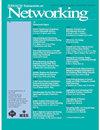PMap:基于强化学习的互联网端口扫描
IF 3.6
3区 计算机科学
Q2 COMPUTER SCIENCE, HARDWARE & ARCHITECTURE
引用次数: 0
摘要
互联网范围扫描是各种网络调查中常用的研究技术,例如测量服务部署和安全漏洞。然而,这些网络调查仅限于给定的端口集,不能全面地获得真实的网络景观,甚至会误导调查结论。在这项工作中,我们介绍了PMap,一个端口扫描工具,可以有效地从整个网络中所有65K端口中发现最开放的端口。PMap利用端口的相关性构建每个网络的开放端口相关图,利用强化学习框架根据反馈结果更新相关图,并动态调整端口扫描的顺序。与当前的端口扫描方法相比,PMap在命中率、覆盖率和侵入性方面表现更好。我们在真实网络上的实验表明,PMap只需扫描每个地址的125个端口(90%@125),就可以找到90%的开放端口,比最先进的端口扫描方法少99.3%。它减少了扫描端口的数量,以减少端口扫描的侵入性。此外,PMap是高度并行和轻量级的。它并行扫描500个网络,实现每秒高达1800万个端口推荐率,仅消耗7GB内存。PMap是第一个使用强化学习扫描开放端口的有效实践。它弥补了现有扫描工具的不足,有效地支持后续的服务发现和安全研究。本文章由计算机程序翻译,如有差异,请以英文原文为准。
PMap: Reinforcement Learning-Based Internet-Wide Port Scanning
Internet-wide scanning is a commonly used research technique in various network surveys, such as measuring service deployment and security vulnerabilities. However, these network surveys are limited to the given port set, not comprehensively obtaining the real network landscape, and even misleading survey conclusions. In this work, we introduce PMap, a port scanning tool that efficiently discovers the most open ports from all 65K ports in the whole network. PMap uses the correlation of ports to build an open port correlation graph of each network, using a reinforcement learning framework to update the correlation graph based on feedback results and dynamically adjust the order of port scanning. Compared to current port scanning methods, PMap performs better on hit rate, coverage, and intrusiveness. Our experiments over real networks show that PMap can find 90% open ports by only scanning 125 ports (90%@125) to each address, which is 99.3% less than the state-of-the-art port scanning methods. It reduces the number of scanned ports to decrease the intrusive nature of port scanning. In addition, PMap is highly parallel and lightweight. It scans 500 networks in parallel, achieving a port recommendation rate of up to 18 million per second, consuming only 7GB of memory. PMap is the first effective practice for scanning open ports using reinforcement learning. It bridges the gap of existing scanning tools and effectively supports subsequent service discovery and security research.
求助全文
通过发布文献求助,成功后即可免费获取论文全文。
去求助
来源期刊

IEEE/ACM Transactions on Networking
工程技术-电信学
CiteScore
8.20
自引率
5.40%
发文量
246
审稿时长
4-8 weeks
期刊介绍:
The IEEE/ACM Transactions on Networking’s high-level objective is to publish high-quality, original research results derived from theoretical or experimental exploration of the area of communication/computer networking, covering all sorts of information transport networks over all sorts of physical layer technologies, both wireline (all kinds of guided media: e.g., copper, optical) and wireless (e.g., radio-frequency, acoustic (e.g., underwater), infra-red), or hybrids of these. The journal welcomes applied contributions reporting on novel experiences and experiments with actual systems.
 求助内容:
求助内容: 应助结果提醒方式:
应助结果提醒方式:


